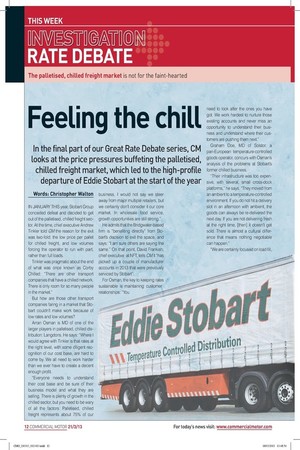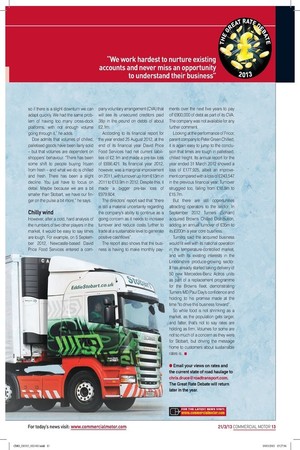Feeling the chill In the final part of our Great
Page 8

Page 9

If you've noticed an error in this article please click here to report it so we can fix it.
Rate Debate series, CM looks at the price pressures buffeting the palletised, chilled freight market, which led to the high-profile departure of Eddie Stobart at the start of the year Words: Christopher Walton IN JANUARY THIS year, Stobart Group conceded defeat and decided to get out of the palletised, chilled freight sector. At the time, chief executive Andrew Tinkler told CM the reason for the exit was two-fold: the low price per pallet for chilled freight, and low volumes forcing the operator to run with part, rather than full loads.
Tinkler was pragmatic about the end of what was once known as Corby Chilled: "There_ are other transport companies that have a chilled network. There is only room for so many people in the market."
But how are those other transport companies faring in a market that Stobart couldn't make work because of low rates and low volumes?
Arran Osman is MD of one of the larger players in palletised, chilled distribution: Langdons. He says: "Where I would agree with Tinkler is that rates at the right level, with some diligent recognition of our cost base, are hard to come by. We all need to work harder than we ever have to create a decent enough profit.
"Everyone needs to understand their cost base and be sure of their business model, and what they are selling. There is plenty of growth in the chilled sector, but you need to be wary of all the factors. Palletised, chilled freight represents about 75% of our business. I would not say we steer away from major multiple retailers, but we certainly don't consider it our core market. In wholesale food service, growth opportunities are still strong."
He admits that the Bridgwater-based firm is "benefiting directly" from Stobart's decision to exit the space, and says: "I am sure others are saying the same." On that point, David Frankish, chief executive at NFT, tells CM it "has picked up a couple of manufacturer accounts in 2013 that were previously serviced by Stobart".
For Osman, the key to keeping rates sustainable is maintaining customer relationships: "You need to look after the ones you have got. We work hardest to nurture those existing accounts and never miss an opportunity to understand their business and understand where their customers are pushing them next."
Graham Doe, MD of Solstor, a pan-European temperature-controlled goods operator, concurs with Osman's analysis of the problems at Stobart's former chilled business.
"Their infrastructure was too expensive, with several, small cross-dock platforms," he says. "They moved from an ambient to a temperature-controlled environment. If you do not hit a delivery slot in an afternoon with ambient, the goods can always be re-delivered the next day. If you are not delivering fresh at the right time, [then] it doesn't get sold. There is almost a cultural difference that means nothing negotiable can happen."
"We are certainly focused on load fill, so if there is a slight downturn we can adapt quickly. We had the same problem of having too many cross-dock platforms, with not enough volume going through it," he adds.
Doe admits that volumes of chilled, palletised goods have been fairly solid — but that volumes are dependent on shoppers' behaviour. "There has been some shift to people buying frozen from fresh — and what we do is chilled and fresh. There has been a slight decline. You just have to focus on detail. Maybe because we are a bit smaller than Stobart, we have our f inger on the pulse a bit more," he says.
Chilly wind However, after a cold, hard analysis of the numbers of two other players in the market, it would be easy to say times are tough. For example, on 5 September 2012, , Newcastle-based David Price Food Services entered a com pany voluntary arrangement (OVA) that will see its unsecured creditors paid 38p in the pound on debts of about £2.1m.
According to its financial report for the year ended 25 August 2012, at the end of its financial year David Price Food Services had net current liabilities of £2.1m and made a pre-tax loss of £686,421. Its financial year 2012, however, was a marginal improvement on 2011, with turnover up from £13m in 2011 to £13.9m in 2012. Despite this, it made a bigger pre-tax loss of £979,804.
The directors' report said that "there is still a material uncertainty regarding the company's ability to continue as a going concern as it needs to increase turnover and reduce costs further to trade at a sustainable level to generate positive cashf lows".
The report also shows that the business is having to make monthly pay ments over the next five years to pay off £900,000 of debt as part of its OVA. The company was not available for any further comment.
Looking at the performance of Fricor, parent company to Peter Green Chilled, it is again easy to jump to the conclusion that times are tough in palletised, chilled freight. Its annual .report for the year ended 31 March 2012 showed a loss of £177,925, albeit an improvement compared with a loss of £243,547 in the previous financial year. Turnover struggled too, falling from £16.8m to £15.7m.
But there are still opportunities attracting operators to the sector. In September 2012 Turners (Soham) acquired Browns Chilled Distribution, adding an annual turnover of £35m to its £200m a year core business.
Turners said the acquired business would fit well with its national operation in the temperature-controlled market, and with its existing interests in the LincOlnshire produce-growing sector. It has already started taking delivery of 50 new Mercedes-Benz Actros units as pt of a replacement programme for the Browns fleet, demonstrating Turners MD Paul Day's confidence and holding to his promise made at the time "to drive thS business forward".
So while food is not shrinking as a market, as the population gets larger, and fatter, that's not to say rates are holding as firm. Volumes for some are not so much of a concern as they were for Stobart, but driving the message home to customers about sustainable rates is. • • Email your views on rates and the current state of road haulage to chris.druce@roadtransport.com. The Great Rate Debate will return later in the year.






































